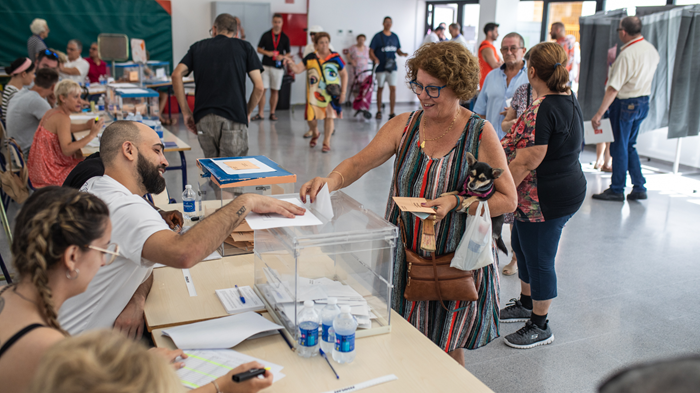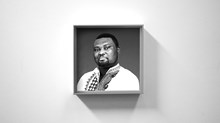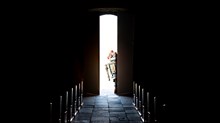
Eye-catching election placards are popping up across the European Union. They appear overnight in public squares and in front of train stations, along the Autobahn and the Champs-Élysées and many lesser-known rues, strassen, and calles.
With bright colors and bold slogans, each promises to make a difference in the European Parliament, if only passersby will vote for their party in the upcoming election.
“Make Europe strong,” says one.
“Make it happen,” urges another.
And there’s a new slogan for a new party in Spain: “United in values, guided by faith.”
The sign asks people to vote for Fe, Infancia, Educación, y Libertad (Faith, Childhood, Education, and Liberty) or FIEL, a new, explicitly evangelical Christian party. The party’s candidate for the European Parliament may not actually appear on ballots in June, though. Before Juan José Cortés can stand for election, FIEL needs 15,000 signatures by May 12.
“We are at a crucial moment,” party president Salvador Martí wrote in a recent campaign letter. “Your signature is essential so that we can continue in the battle, and so that together we can work for a better future for all.”
Martí acknowledges this is an uphill battle. Many experts say it’s basically impossible to build a new party from scratch out of a tiny religious minority. Evangelicals make up about 2 percent of the Spanish population. There are fewer than 5,000 evangelical congregations in the whole country, even with the recent increase in evangelical immigrants.
“We do not want to settle for the obstacles that say that it is not possible to build a party built by citizens like you and me in Spain,” Martí wrote in April.
The once-every-five-year election presents a strategic opportunity for evangelicals seeking to have more influence on European politics.
The European Union’s 447 million citizens in 27 countries have the chance to vote from June 6 to 9, electing 720 politicians to the parliament in Brussels. Those leaders, sitting in the EU’s only directly elected legislative body, will provide democratic oversight to the European government. They will pass laws and approve budgets, together with the council of appointed representatives of member countries, and steer the EU into the future.
Evangelical parties like FIEL may have a chance in 2024 to make some gains, due to general discontent with the long-established ruling parties. But they will have to cut through disinformation, reach generally disinterested voters, and jockey for position amid a range of parties hoping to capitalize on that discontent.
At the moment, polls suggest Europe’s far-right parties—including Alternative for Germany in Germany, National Rally in France, and Vox in Spain—are winning over voters dissatisfied with the status quo.
The center-left and center-right parties that have historically dominated since World War II will probably win enough seats to form a governing coalition. But the current president of the European Commission, Ursula von der Leyen of Germany, said her party in Brussels might have to consider working with these far-right groups. Left-leaning members of the current coalition say that would be unacceptable.
Amid the fray, Christian candidates—evangelicals among them—are trying to join multi-party groups and to win seats so that they can have an impact. In the last election in 2019, for example, three members of the European Christian Political Movement (ECPM) won seats: Bert-Jan Ruissen, from a conservative Calvinist party in the Netherlands; Peter van Dalen from the centrist Christian Union in the Netherlands; and Helmut Geuking, a Greek Catholic, who is part of the social conservative Family Party of Germany. Cristian Terjeș, from the Christian Democratic National Peasants’ Party in Romania, became the ECPM’s fourth representative in the European Parliament the following year.
The ECPM’s general director, Maarten van de Fliert, said the 22 separate parties that make up the ECPM all want to promote their Christian values in EU politics. What that looks like, though, can vary a lot from country to country, party to party, and denomination to denomination.
“All these different denominations and all the different interpretations of doing Christian politics also reflects the colorful diversity of the Christian faith and of the Lord God,” Van de Fliert told CT. “How the parties want to implement those Christian views varies very much, along the line of church denominations.”
Van de Fliert could not say whether any of the ECPM politicians are evangelicals, though. The distinction did not make sense to him.
“It does not work like that in Europe,” he said.
Arie de Pater, who represents the European Evangelical Alliance (EEA) in Brussels, said there are about 20 million evangelicals in Europe, but they don’t have a single political identity and aren’t unified, in all their different political contexts, around any one-party program.
The EEA is non-partisan but lobbies to advance biblical beliefs and values at the European level. De Pater said the organization has traditionally focused on freedom of belief, freedom of expression, policies that strengthen families, and politics that protect life by limiting abortion and assisted suicide. In this election, de Pater said, many evangelicals represented by the EEA have also expressed concerns about humanitarian aid for asylum seekers and the possible future dangers of artificial intelligence.
The EEA also does a lot of work encouraging evangelical involvement in EU politics.
“We want to show people the importance of the parliament and the upcoming elections,” de Pater said. “The parliament will shape the future of the European Union for the next five years, if not longer. It’s important we engage the debate.”
In other words, de Pater said the EEA wants to “draw people into Europe.”
FIEL, however, wants to change the way Europe works. Similar to other populist parties, FIEL hopes to draw support from Spaniards frustrated with politics as usual in Brussels.
“Europe is at a key moment in a fierce battle where policies based on lies are confronted with policies based on truth,” Martí told CT, “and where attempts are being made to bury the Christian principles of Europe.”
Martí is a police officer in the northern city of Logroño who achieved some media notoriety a few years ago as a result of his educational project, “Alexia Enséñanos,” which seeks to protect children from possible abuses, and the other leaders of FIEL have gathered educators, lawyers, political scientists, social workers, and pastors with deep Christian convictions, who all share common concerns. Some of the concerns are familiar evangelical issues, like protecting the sanctity of human life and religious freedom. But the leaders are also talking about “uncontrolled immigration, poverty, and social disintegration,” according to a FIEL party statement.
The issue that galvanized Martí and others to found the party is public schools. FIEL proposes granting parents “the ability to set limits to schools” and guaranteeing them the right to be “informed and consulted on the activities in which their children will participate.” They would also like to eliminate “the promotion of inclusive language in school material” and to change sex education so that it “does not destroy innocence.”
FIEL shares some agenda items with the rising right-wing party Vox, which supports “traditional values” and opposes what it calls Spain’s “progressive dictatorship.” Vox wants parents to be able to opt their children out of mandatory classes if the instruction goes against their values.
Martí said he agrees with some of what Vox wants and that there are evangelical brothers in that party “doing their bit to bring change to Spain,” but he also said FIEL is different. It’s distinctly religious and distinctly evangelical.
“Our first responsibility is to be faithful to God and to the principles of the Bible, not to partisan interests, not even our own,” Martí said.
As of mid-May, however, the party only had about half the signatures necessary to get on the ballot. And some of the nation’s evangelicals haven’t even heard of FIEL and its slogan, “United in values, guided by faith.”
Diego Huelva, a 41-year-old evangelical living on the outskirts of Seville, said he was surprised to hear that a Spanish evangelical party would even attempt to stand for elections. Huelva said evangelicals in Spain have generally not been interested in working in politics because of their experience of repression under the Francisco Franco dictatorship.
Recently, however, Huelva has seen an increase in more outspoken evangelicals from Latin America who are interested in joining the political fray.
“They come with different perspectives on politics, and feel called to participate more actively,” he said. “The more they become integrated here in Europe, the more they will try and shape European politics.”
That’s the future, though. In 2024, the prospects for an explicitly evangelical party in Spain seem very thin.
“Getting those signatures would be a huge success,” Huelva said. “Getting someone elected to parliament would be a miracle.”

Support Our Work
Subscribe to CT for less than $4.25/month


















